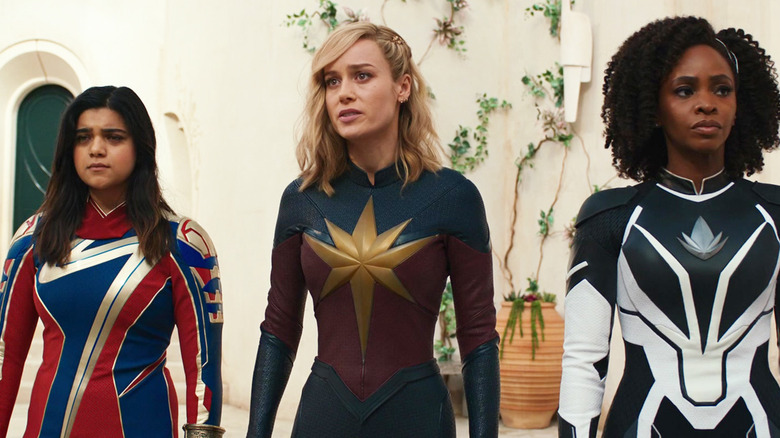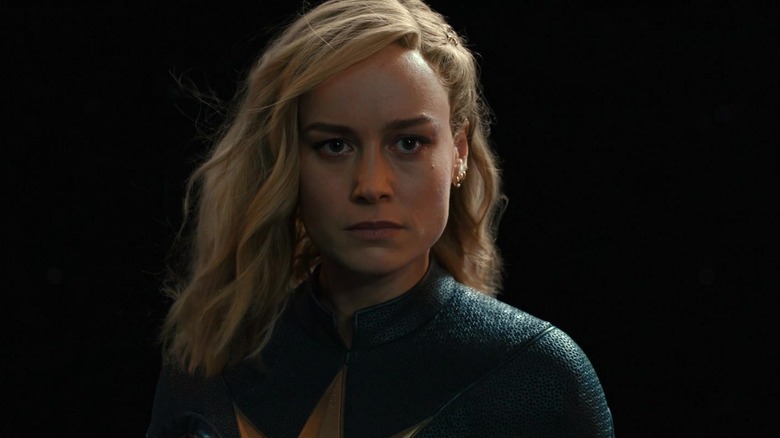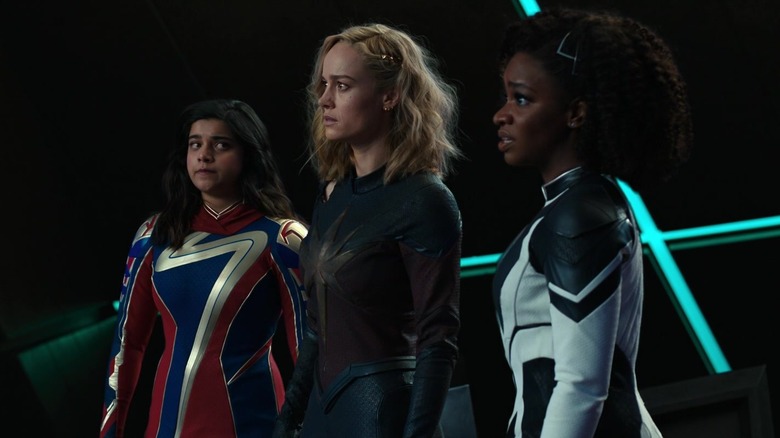The Marvels Director Explains What Went Wrong With The Brie Larson Sequel
In 2019, "Captain Marvel" introduced us all to Brie Larson's fighter pilot turned superhero Carol Danvers, and, apparently, we were all delighted to meet her. The film made $1.1 billion at the global box office and even managed a very respectable 79% on Rotten Tomatoes. Larson's new hero was, it seemed, a welcome addition to the Marvel Cinematic Universe, which at that point was yet to enter the nadir that has been the last few years for the franchise.
The sequel to "Captain Marvel," however, has now come to represent that nadir. 2023's "The Marvels" was, as /Film's Jeremy Mathai wrote in his review, a cosmic disappointment that could barely get off the ground. By the end of its theatrical run, "The Marvels" had become the lowest-grossing MCU movie ever, grossing just shy of $200 million globally. That's bad enough for a film that constitutes part of the biggest blockbuster franchise in history, but is even worse given the movie cost $300 million to make.
In fairness, that would be a ridiculous budget for any film, MCU or otherwise. "The Marvels" pointed to a bigger problem in Hollywood, namely that studios have simply been spending far too much on movies of late. But how did the budget get to $300 million in the first place? Well, it seems a big part of the problem was that "The Marvels" underwent four weeks of reshoots, which, according to Variety, represented an attempt to "bring coherence to a tangled storyline."
For director Nia DaCosta, who also co-wrote the film's screenplay with Megan McDonnell and Elissa Karasik, seeing the movie perform so poorly surely wasn't easy — especially since it sounds like the final product differed so much from her original vision that it wasn't even really her movie any more.
The Marvels was not the movie Nia DaCosta wanted to make
Nia DaCosta, who is set to direct an upcoming "28 Years Later" sequel, had proven herself a versatile filmmaker by the time she came into the MCU fold, with the crime-drama "Little Woods" and the 2021 "Candyman" sequel already under her belt. That's one reason why it's not really fair to blame the director for the failure of "The Marvels," with the other being that large portions of the film's production were out of her hands. Now, DaCosta has spoken more about that aspect of the movie's creation.
Speaking at Dublin's second annual screenwriting festival (per ComicBookMovie), DaCosta described what sounds like a frustrating process that saw her own ideas and vision for "The Marvels" sidelined in favor of a larger franchise picture that didn't necessarily line up with the story she was trying to tell. "They had a date, and they were prepping certain things, and you just have to lean into the process hardcore," DaCosta explained. She also discussed how she and Marvel Studios differed in their approach to filmmaking:
"The way they make those films is very different to the way, ideally, I would make a film, so you just have to lean into the process and hope for the best. The best didn't happen this time, but you kind of have to trust in the machine."
DaCosta sounds like she's being as diplomatic as possible here, especially considering her recollection of the moment she realized her original conception of the film just wasn't going to happen. "It was interesting," she admitted, "because there was a certain point when I was like, 'Okay, this isn't going to be the movie that I pitched or even the first version of the movie that I shot.'" Still, DaCosta was able to put a somewhat positive spin on the whole thing, describing the experience as a "learning curve" and claiming that it ultimately "makes you stronger as a filmmaker in terms of your ability to navigate."
The Marvels was doomed before Nia DaCosta even came onboard
There are many reasons why "The Marvels" will remain an infamous entry in the MCU, but a big part of the problem was that the movie simply had too much franchise lore to shoehorn into its runtime. The 33rd MCU film tied up threads from multiple other projects, the first being the Disney+ series, "WandaVision," which featured the debut of Monica Rambeau (Teyonah Parris), the daughter of Carol's best friend, Maria Rambeau (Lashana Lynch), and one of the three main heroes in "The Marvels." Then there was "Ms. Marvel," a breath of fresh air for superhero shows that introduced us to Iman Vellani's Kamala Khan, a Pakistani-American high schooler who gains Captain Marvel-like powers thanks to a mysterious bangle that had been in her family for generations.
After this, MCU fans were subjected the absolute travesty that was "Secret Invasion," a Disney+ series that somehow managed to make international spycraft and what remains one of the biggest comic book events in Marvel history as dull an experience as the MCU has ever churned out — and that's saying something. The show is only noteworthy for the way in which it ends with Samuel L. Jackson's Nick Fury and Charlayne Woodard's Varra departing Earth to negotiate a peace deal between the Skrulls and Kree, both of whom were introduced in the "Captain Marvel" movie.
You might be starting to see why "The Marvels" might not have been the hit Kevin Feige and co. hoped for. All these arcane details and needlessly complex attempts at worldbuilding would be bad enough already if they weren't so boring. By the time "The Marvels" debuted, then, most fans had checked out from this convoluted mess of a storyline, so imagine how interested general audiences were. (Not very.) The point being that, reshoots and studio meddling aside, none of this was Nia DaCosta's fault.


